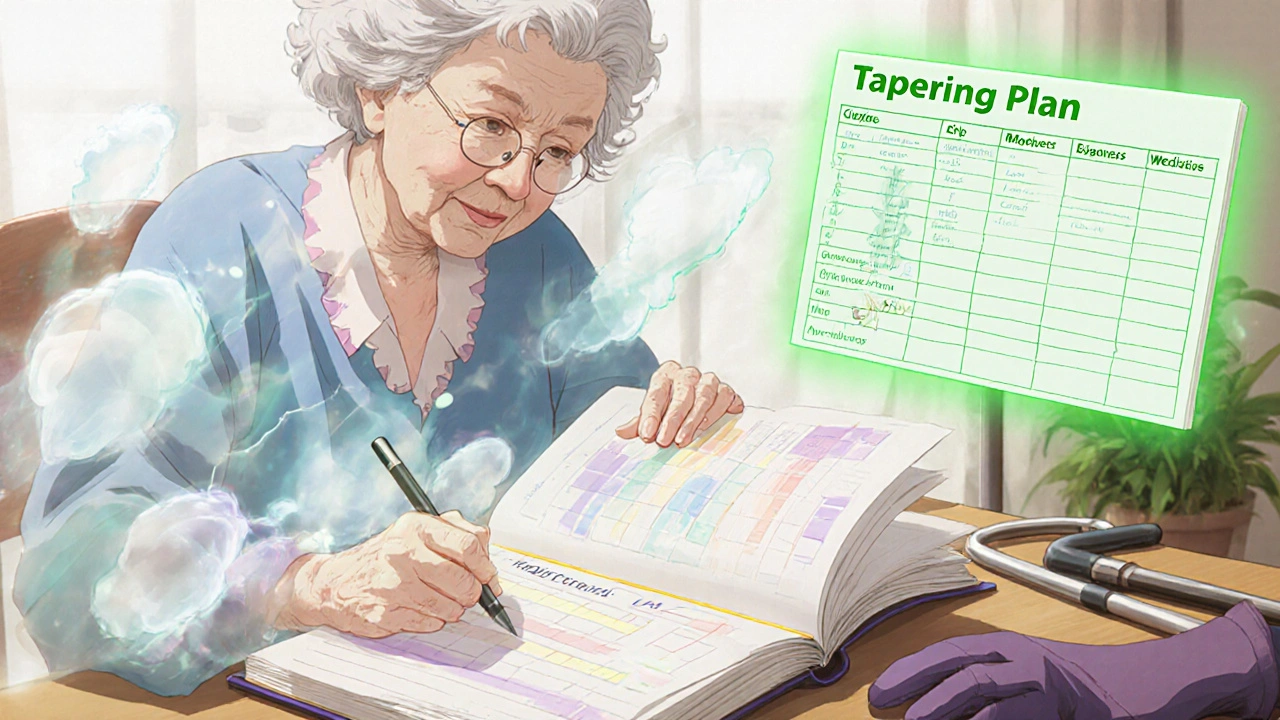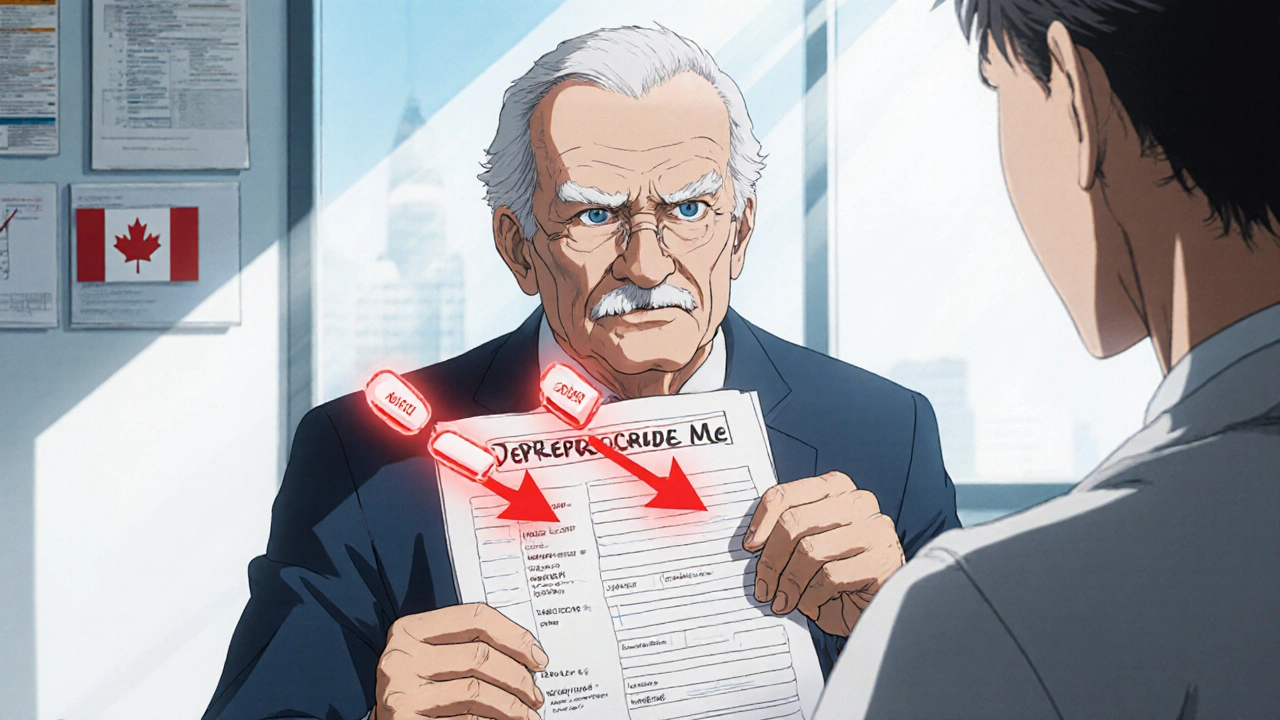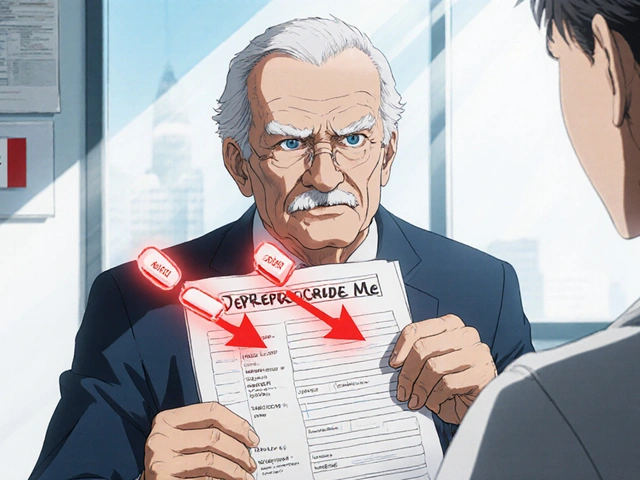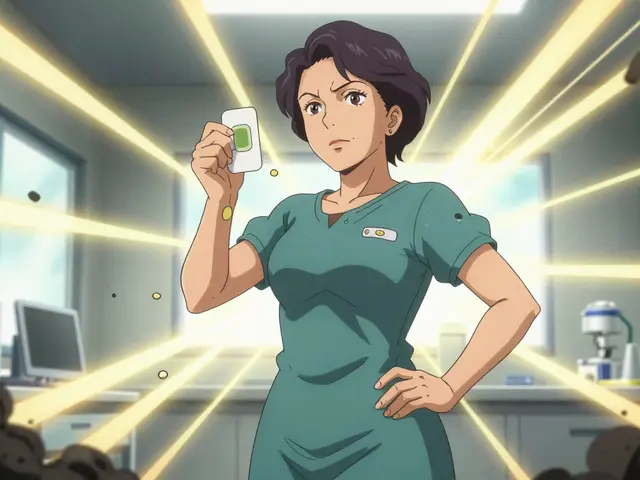Many older adults take five, six, or even more medications every day. Some of these were prescribed years ago for conditions that have changed-or even disappeared. But no one ever asked if they’re still needed. That’s where deprescribing comes in. It’s not about stopping all your meds. It’s about making sure each one still helps more than it hurts. And the best way to start that conversation? You do.
Why This Matters Right Now
About 15% of seniors on five or more medications experience harmful side effects like dizziness, confusion, falls, or kidney problems. These aren’t rare. They’re common. And many of them come from drugs that no longer serve a purpose. Maybe your blood pressure is now too low. Maybe your cholesterol hasn’t been high in years. Maybe the painkiller you took for arthritis now makes you foggy in the morning. When benefits fade but risks stay the same-or grow-that’s when deprescribing makes sense.Doctors know this. But they rarely bring it up. A 2023 study found that 68% of seniors would welcome fewer pills-if only someone asked them first. That’s a gap. And you can close it.
Prepare Before the Appointment
Walking into a doctor’s office with a vague wish like “I want to take fewer pills” rarely works. You need facts. Here’s what to do:- Write down every medication-prescription, over-the-counter, vitamins, supplements. Don’t forget the aspirin you take daily or the melatonin you use for sleep. About 23% of patients leave something out, and that skews the whole review.
- Track side effects. Not just “I feel tired.” Write: “Dizziness 2 hours after taking metoprolol, almost fell twice last week.” Specifics matter. Doctors notice patterns when you give them data.
- Choose 1-2 medications to focus on. Pick ones you suspect are causing trouble. Maybe it’s the sleeping pill that leaves you groggy. Or the statin that gives you muscle aches. Don’t try to tackle everything at once.
- Know your goals. What do you want to be able to do? Walk without help? Play with your grandkids? Sleep through the night? Tie your own shoes? Connect your medication concerns to real life. Say: “I’m on three blood pressure pills, but my readings are always under 100/60. I don’t want to risk falling just to keep a number low.”
- Bring printed info. The Canadian Deprescribing Guidelines or the Beers Criteria are free, trusted resources. Print a page on the drug you’re questioning. It shows you’ve done your homework-and makes your doctor more likely to listen.
Start the Conversation the Right Way
Don’t lead with: “Can I stop this?” That puts your doctor on the defensive. Instead, use the ask-tell-ask method:- Ask: “What’s your view on how my medications are working for me right now?”
- Tell: “I’ve noticed I get really dizzy after my 8 a.m. dose of amiodarone. I’ve been avoiding stairs because I’m scared I’ll fall. I’d like to see if we could lower the dose or try something else.”
- Ask: “What would be the safest way to test if reducing this helps?”
This approach works because it’s collaborative. It doesn’t say, “You made a mistake.” It says, “Let’s fix this together.”

Use Language That Resonates
Not all reasons for deprescribing land the same way. Research shows patients respond best to explanations tied to daily life, not statistics.A 2021 study in JAMA Network Open found that phrases like:
“Some of your medications may be hurting you more than helping-especially when they make you dizzy or confused.”
Were rated 4.7 out of 5 for effectiveness. Meanwhile, talking about cost or life expectancy got low scores. For seniors, it’s not about money. It’s about safety and independence.
Try these instead:
- “I want to keep hiking with my grandkids. I’m worried this medication is making me unsteady.”
- “I used to read every night. Now I’m too foggy after dinner. Could this pill be the reason?”
- “My blood pressure is fine now. Do I still need three pills to keep it there?”
These statements connect medicine to meaning. And that’s what moves the needle.
Expect Gradual Changes-Not Instant Cuts
Deprescribing isn’t a switch. It’s a dimmer. Most successful cases involve slowly lowering doses over weeks or months. That’s called a “drug holiday” or tapering.Your doctor might suggest:
- Reducing the dose by 25% every 4 weeks
- Skipping a pill one day a week to test how you feel
- Switching to a different drug with fewer side effects
Ask: “What signs should I watch for if we reduce this?”
Some medications can cause rebound effects-like higher blood pressure or worse anxiety-if stopped too fast. You need a plan. Bring up monitoring: “Can we schedule a check-in in 3 weeks to see how I’m doing?”

What If Your Doctor Says No?
It happens. Sometimes it’s because the drug is still needed. Sometimes it’s because the doctor isn’t trained in deprescribing. Only 22% of primary care doctors feel confident leading these conversations.If you get a flat “no,” don’t give up. Say:
“I understand you’re concerned. Could we get a second opinion from a geriatric pharmacist or a specialist who works with older adults on medication safety?”
Many hospitals and clinics now have geriatric pharmacy services. Medicare even started paying for medication reviews during Annual Wellness Visits in 2024. Ask if one is available.
What to Do After the Appointment
If you and your doctor agree on a plan:- Get it in writing. Ask for a printed summary of what’s being changed and why.
- Set a follow-up date. Don’t wait for symptoms to get worse.
- Keep tracking side effects. Use a notebook or phone app. Note changes in energy, sleep, balance, or mood.
- Call your pharmacist. They can flag interactions you might miss.
One woman in Portland started a “medication impact journal” after her doctor agreed to cut her antipsychotic. She wrote down how each pill affected her ability to cook, walk, or talk to friends. Six months later, she’d stopped three drugs-and was gardening again.
You’re Not Asking for Less Care. You’re Asking for Better Care.
Some people worry that asking to reduce meds means their doctor thinks they’re not worth treating. That’s not true. In fact, the opposite is true. Deprescribing is one of the most thoughtful, patient-centered things a clinician can do.Experts say the most successful conversations happen when patients lead with their goals-not their fears. When you say, “I want to stay strong enough to walk my dog,” you’re not rejecting medicine. You’re reclaiming your life.
And you’re not alone. The CDC’s “Right Size My Meds” campaign, launched in 2023, is helping thousands of seniors do exactly this. Electronic health records now flag risky medications for older adults. Pharmacists are being trained to spot overprescribing. The system is changing. But it still needs you to speak up.
So bring your list. Bring your story. Bring your questions. You’ve earned the right to feel safe, clear-headed, and in control of your own body.




